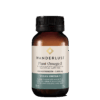Originating from the Mediterranean regions, this perennial plant is now widely cultivated all over the world.
The botanical name Cynara scolymus is derived in part from the tradition of fertilising the plant with ashes (Latin: cinis, cineris), and partly from the Greek word skolymos, meaning “thistle” from the spines found on the bracts (they are not leaves) that enclose the flower heads forming the edible portion of the plant.
According to Greek myth, the artichoke owes its existence to Zeus who fell in love with Cynara, a mortal. He took her to Olympus however, the beauty missed her life on earth and one evening Cynara snuck back to her hometown. Upon her return to Olympus, Zeus was enraged and sent her home, in the form of an artichoke.
Globe artichokes are not only a culinary delight, but also a well-known and popular herbal medicine.





